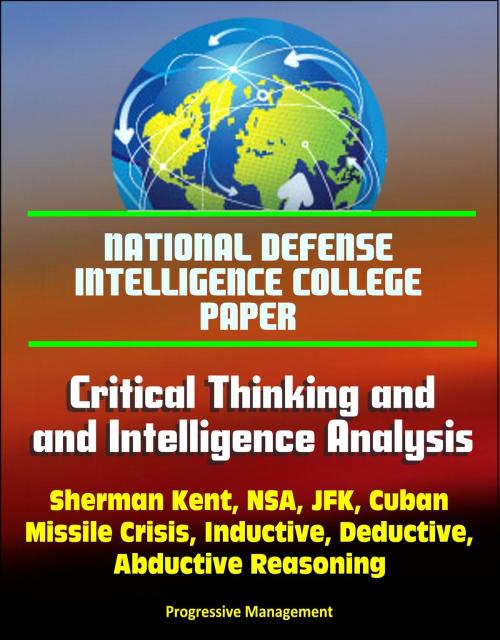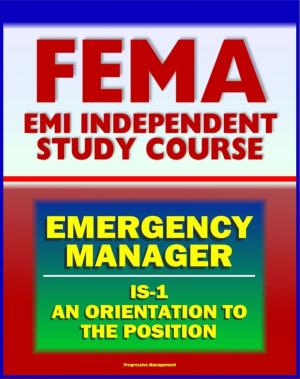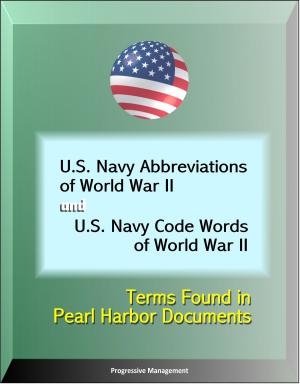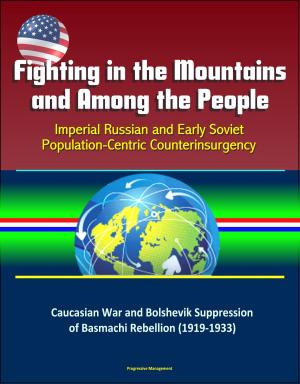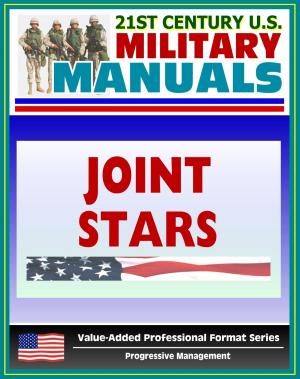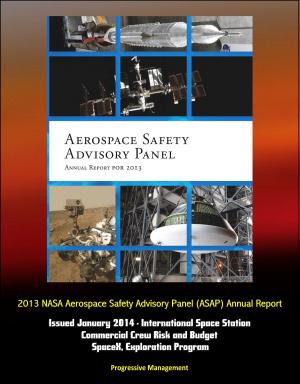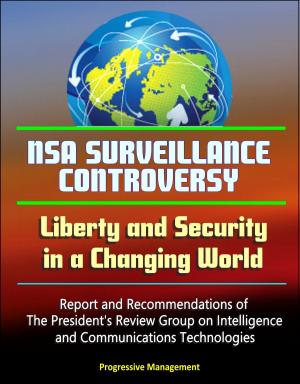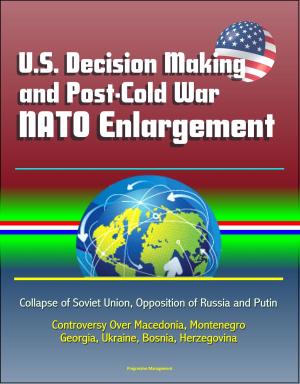National Defense Intelligence College Paper: Critical Thinking and Intelligence Analysis - Sherman Kent, NSA, JFK, Cuban Missile Crisis, Inductive, Deductive, Abductive Reasoning
Nonfiction, History, Military, Strategy| Author: | Progressive Management | ISBN: | 9781311066121 |
| Publisher: | Progressive Management | Publication: | December 3, 2013 |
| Imprint: | Smashwords Edition | Language: | English |
| Author: | Progressive Management |
| ISBN: | 9781311066121 |
| Publisher: | Progressive Management |
| Publication: | December 3, 2013 |
| Imprint: | Smashwords Edition |
| Language: | English |
This unique and informative paper was produced by the National Intelligence University / National Defense Intelligence College. Analysts and analysts alone create intelligence. Although technological marvels assist analysts by cataloguing and presenting data, information and evidence in new ways, they do not do analysis. To be most effective, analysts need an overarching, reflective framework to add structured reasoning to sound, intuitive thinking. "Critical thinking" provides such a framework and goes further, positively influencing the entire intelligence analysis process. Analysts who adopt critical thinking stand to improve their analyses. This paper defines critical thinking in the context of intelligence analysis, explains how it influences the entire intelligence process, explores how it toughens the art of intelligence analysis, suggests how it may be taught, and deduces how analysts can be persuaded to adopt this habit.
Topics and subjects include: Inductive, deductive, and abductive reasoning; noosphere, Cuban missile crisis, Cassandrian approach; Penkosky, Sherman Kent; Fidel Castro; John F. Kennedy; Nikita Khrushchev; Evidentiary assessment; NSA.
Contents: Introduction: How Do People Reason * What Is Critical Thinking? * Defining Critical Thinking * Standards for Critical Thinking * Skill-Based Definitions * A Disposition to Think Critically * The Role of Questions * Pseudo-Critical Thinking * What Can Be Learned from the Past? * Thinking Critically about Cuba * Deploying the Missiles * Assessing the Implications * Between Dogmatism and Refutation * Lacking: Disconfirmation * The Roles of Critical Thinking in the Cuban Crisis * Winners and Losers: The Crisis in Context * Ten Years Later, They Meet Again * Judgment: Critical Thinking Would Have Made a Difference * How Can Intelligence Analysts Employ Critical Thinking? * The Poor Record * Assessing Evidence * Facilitating Evidentiary Assessment * Embracing a Methodology * Creating Better Inferences * Producing Intelligence * How can Analysts be Taught to Think Critically? * Critical Thinking Education * Outside the Intelligence Community * Critical Thinking Education * Inside the Intelligence Community * Implications of Teaching Critical Thinking * Evaluating Teaching Models * Encouraging Analysts to Think Critically * Persuading to Improve Analysis * How Does Critical Thinking Transform? * Transforming Intelligence Corporations * Learning from Early Adopters * The Costs and Benefits of Thinking Critically * Validation * What Other Points of View Exist? * What Does the Future Hold? * Conclusion
The world in which intelligence analysts work has changed dramatically over the 67 years since the beginning of the Second World War. Adversaries have shifted from large armies arrayed on battlefields to individuals lurking in the shadows or in plain sight. Further, plagues and pandemics, as well as floods and famines, pose threats not only to national stability but even to human existence. To paraphrase a Chinese curse, we certainly live in interesting times.
Our times demand fresh, critical reasoning on the part of those tasked to assess and warn about threats as well as those tasked to act on those threats. Education in the bases and practices of intelligence foraging and sensemaking - often called intelligence collection and analysis - is a means by which this can be accomplished. Indeed, the Intelligence Reform and Terrorism Prevention Act of 2004 legislates improved education for intelligence analysis. But, that education is not specifically defined. This volume provides a framework for one area of the act's educational requirement: improving how analysts think - and by extension, how policymakers act. It asserts that people who are skilled critical thinkers are better able to cope with interesting times than those who are not.
This unique and informative paper was produced by the National Intelligence University / National Defense Intelligence College. Analysts and analysts alone create intelligence. Although technological marvels assist analysts by cataloguing and presenting data, information and evidence in new ways, they do not do analysis. To be most effective, analysts need an overarching, reflective framework to add structured reasoning to sound, intuitive thinking. "Critical thinking" provides such a framework and goes further, positively influencing the entire intelligence analysis process. Analysts who adopt critical thinking stand to improve their analyses. This paper defines critical thinking in the context of intelligence analysis, explains how it influences the entire intelligence process, explores how it toughens the art of intelligence analysis, suggests how it may be taught, and deduces how analysts can be persuaded to adopt this habit.
Topics and subjects include: Inductive, deductive, and abductive reasoning; noosphere, Cuban missile crisis, Cassandrian approach; Penkosky, Sherman Kent; Fidel Castro; John F. Kennedy; Nikita Khrushchev; Evidentiary assessment; NSA.
Contents: Introduction: How Do People Reason * What Is Critical Thinking? * Defining Critical Thinking * Standards for Critical Thinking * Skill-Based Definitions * A Disposition to Think Critically * The Role of Questions * Pseudo-Critical Thinking * What Can Be Learned from the Past? * Thinking Critically about Cuba * Deploying the Missiles * Assessing the Implications * Between Dogmatism and Refutation * Lacking: Disconfirmation * The Roles of Critical Thinking in the Cuban Crisis * Winners and Losers: The Crisis in Context * Ten Years Later, They Meet Again * Judgment: Critical Thinking Would Have Made a Difference * How Can Intelligence Analysts Employ Critical Thinking? * The Poor Record * Assessing Evidence * Facilitating Evidentiary Assessment * Embracing a Methodology * Creating Better Inferences * Producing Intelligence * How can Analysts be Taught to Think Critically? * Critical Thinking Education * Outside the Intelligence Community * Critical Thinking Education * Inside the Intelligence Community * Implications of Teaching Critical Thinking * Evaluating Teaching Models * Encouraging Analysts to Think Critically * Persuading to Improve Analysis * How Does Critical Thinking Transform? * Transforming Intelligence Corporations * Learning from Early Adopters * The Costs and Benefits of Thinking Critically * Validation * What Other Points of View Exist? * What Does the Future Hold? * Conclusion
The world in which intelligence analysts work has changed dramatically over the 67 years since the beginning of the Second World War. Adversaries have shifted from large armies arrayed on battlefields to individuals lurking in the shadows or in plain sight. Further, plagues and pandemics, as well as floods and famines, pose threats not only to national stability but even to human existence. To paraphrase a Chinese curse, we certainly live in interesting times.
Our times demand fresh, critical reasoning on the part of those tasked to assess and warn about threats as well as those tasked to act on those threats. Education in the bases and practices of intelligence foraging and sensemaking - often called intelligence collection and analysis - is a means by which this can be accomplished. Indeed, the Intelligence Reform and Terrorism Prevention Act of 2004 legislates improved education for intelligence analysis. But, that education is not specifically defined. This volume provides a framework for one area of the act's educational requirement: improving how analysts think - and by extension, how policymakers act. It asserts that people who are skilled critical thinkers are better able to cope with interesting times than those who are not.
